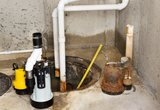Unveiling the Economics of Water Pumps: A Budget-Friendly Guide for New Zealand Businesses
0 comments
Optimising costs without compromising efficiency is paramount in New Zealand businesses' dynamic landscape. When it comes to water pump investments, understanding the economics involved is crucial for sustainable operations. This comprehensive guide delves into the factors influencing water pump costs, explores budget-friendly solutions, and equips businesses with the knowledge to make informed investment decisions.
Understanding Water Pump Costs in New Zealand
Comprehending the various costs associated with investing in a water pump is essential. From installation of the initial purchase to ongoing maintenance, businesses need a clear understanding of the financial aspects of acquiring and maintaining water pump systems.
Whether browsing through a diverse range of pumps, considering reputable brands, or evaluating suitable locations for installation, businesses can tailor their choices to fit specific needs. The costs associated with pumps can vary based on factors like drainage requirements, domestic usage patterns, and the need for additional accessories such as efficient and portable pumping solutions.
Factors Influencing Commercial Water Pump Expenses
Numerous factors impact the overall expenses tied to commercial water pumps. Variables to consider include pump type, capacity, energy efficiency, and the specific needs of different industries. Recognising these influences empowers businesses to tailor their water pump investments to their unique operational requirements.
Considering rural settings highlights the importance of choosing pumps that efficiently handle rural water requirements. A focus on cleaning applications and managing bores effectively ensures that the chosen pumps align with the rugged demands of rural locations.
Budget-Friendly Water Pump Solutions for NZ Businesses
In the quest for cost-effective water pump solutions, businesses can explore a range of options tailored to New Zealand's economic landscape. Look at pumps known for their efficiency, durability, affordability, and models that balance performance and budget considerations.
Choosing compact and portable pumps designed for specific applications, such as those offering efficient water transfer, ensures that businesses can meet their operational needs without compromising cost-effectiveness. A1 Pumps, with its diverse product line, offers solutions perfectly designed for New Zealand businesses seeking ideal and cost-efficient water pump options.
Calculating ROI: Making Informed Investment Decisions
Investing in water pumps should meet immediate needs and provide a solid return on investment (ROI) over time. A positive ROI means ensuring that every dollar spent on a water pump contributes positively to long-term operational efficiency.
By fully analysing and understanding the long-term benefits and cost savings associated with sustainable water pump solutions, businesses can make sound business decisions that align with their financial goals. A1 Pumps' commitment to providing products built for durability and efficiency contributes to a positive ROI over the period of pump usage.
Managing and Optimising Operational Costs
Beyond the initial investment, businesses can optimise operational costs associated with water pump usage. This involves implementing best practices in maintenance, energy efficiency, and troubleshooting common issues. By actively managing these aspects, businesses can ensure the longevity of their water pump systems while minimising ongoing expenses.
Regular maintenance checks, incorporating efficient cleaning procedures, and ensuring pumps are designed to handle the level of demand in specific applications contribute to sustained operational efficiency. A1 Pumps offers products that are not only built for performance but are also designed to minimise the time and effort required for maintenance.
Case Studies: Successful Cost-Effective Water Pump Implementations
Example 1: Sustainable Farming Practices in Waikato
A dairy farm in Waikato faced the challenge of optimising water distribution for its expansive rural setting while adhering to a budget. A1 Pumps recommended a solar-powered water pump solution, aligning with the farm's commitment to sustainable practices. The compact and portable design ensured efficient water transfer, reducing operational costs. This cost-effective implementation resulted in substantial energy savings and enhanced productivity. The farm achieved an ideal balance between environmental consciousness and economic efficiency, showcasing the success of tailored, budget-friendly water pump solutions.
Example 2: Efficient Irrigation in Canterbury Vineyards
In the renowned vineyards of Canterbury, a winery sought a cost-effective solution for its irrigation needs. A1 Pumps proposed a centrifugal pump known for its efficiency in large-scale water distribution. This pump's robust design and efficient transfer capabilities allowed the vineyard to optimise its irrigation processes while adhering to budget constraints. The implementation resulted in increased crop yields and minimised water wastage. The success of this cost-effective water pump solution highlights how strategic choices can lead to significant economic benefits for businesses, even in specialised applications such as vineyard irrigation.
Frequently Asked Questions
Q1. What factors contribute to water pump costs in NZ?
A1. Factors, including pump type, capacity, energy efficiency, and application-specific needs, contribute to the overall costs. Understanding and being fully aware of these factors helps businesses make informed decisions aligned with their requirements and budget.
Q2. What is the most efficient type of water pump?
A2. A water pump's efficiency depends on the application's specific needs. Centrifugal pumps are efficient for large-scale water distribution, while submersible pumps are suitable for wells and precise irrigation.
Q3. What is the ROI for commercial water pump installations in NZ?
A3. Calculating ROI involves considering energy savings, operational efficiency, and maintenance costs over the pump's lifespan. A1 Pumps' durable and efficient solutions contribute positively to long-term ROI.
Q4. How long do commercial pumps last?
A4. The lifespan of commercial pumps varies based on factors like usage, maintenance, and pump type. With proper care, high-quality pumps from A1 Pumps can offer long-lasting performance.
In conclusion, this guide aims to demystify the economics of water pumps for New Zealand businesses. Businesses can make strategic and economically sound decisions regarding their water pump investments by understanding costs, exploring budget-friendly solutions, calculating ROI, and optimising operational expenses.
Ready to enhance your business's water management? Contact A1 Pumps today to explore our extensive range of high-quality and efficient water pumps. From large-scale industrial applications to precision irrigation in agriculture, we have the perfect solution for your needs. Ensure a seamless and reliable pumping system with A1 Pumps – Your Trusted Partner in Water Pump Solutions.



0 comments